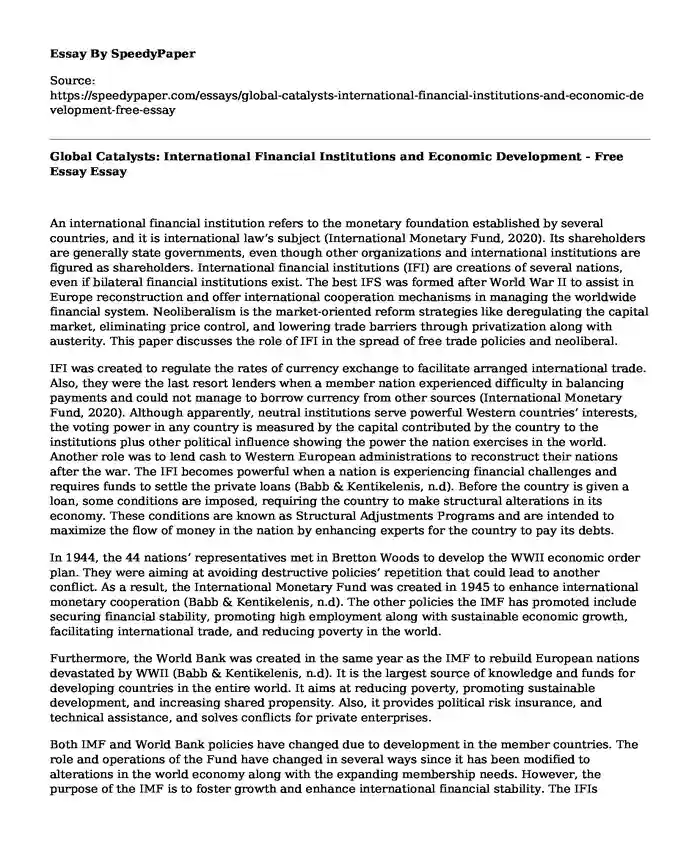
| Type of paper: | Essay |
| Categories: | Economics Finance Development |
| Pages: | 3 |
| Wordcount: | 693 words |
An international financial institution refers to the monetary foundation established by several countries, and it is international law’s subject (International Monetary Fund, 2020). Its shareholders are generally state governments, even though other organizations and international institutions are figured as shareholders. International financial institutions (IFI) are creations of several nations, even if bilateral financial institutions exist. The best IFS was formed after World War II to assist in Europe reconstruction and offer international cooperation mechanisms in managing the worldwide financial system. Neoliberalism is the market-oriented reform strategies like deregulating the capital market, eliminating price control, and lowering trade barriers through privatization along with austerity. This paper discusses the role of IFI in the spread of free trade policies and neoliberal.
IFI was created to regulate the rates of currency exchange to facilitate arranged international trade. Also, they were the last resort lenders when a member nation experienced difficulty in balancing payments and could not manage to borrow currency from other sources (International Monetary Fund, 2020). Although apparently, neutral institutions serve powerful Western countries’ interests, the voting power in any country is measured by the capital contributed by the country to the institutions plus other political influence showing the power the nation exercises in the world. Another role was to lend cash to Western European administrations to reconstruct their nations after the war. The IFI becomes powerful when a nation is experiencing financial challenges and requires funds to settle the private loans (Babb & Kentikelenis, n.d). Before the country is given a loan, some conditions are imposed, requiring the country to make structural alterations in its economy. These conditions are known as Structural Adjustments Programs and are intended to maximize the flow of money in the nation by enhancing experts for the country to pay its debts.
In 1944, the 44 nations’ representatives met in Bretton Woods to develop the WWII economic order plan. They were aiming at avoiding destructive policies’ repetition that could lead to another conflict. As a result, the International Monetary Fund was created in 1945 to enhance international monetary cooperation (Babb & Kentikelenis, n.d). The other policies the IMF has promoted include securing financial stability, promoting high employment along with sustainable economic growth, facilitating international trade, and reducing poverty in the world.
Furthermore, the World Bank was created in the same year as the IMF to rebuild European nations devastated by WWII (Babb & Kentikelenis, n.d). It is the largest source of knowledge and funds for developing countries in the entire world. It aims at reducing poverty, promoting sustainable development, and increasing shared propensity. Also, it provides political risk insurance, and technical assistance, and solves conflicts for private enterprises.
Both IMF and World Bank policies have changed due to development in the member countries. The role and operations of the Fund have changed in several ways since it has been modified to alterations in the world economy along with the expanding membership needs. However, the purpose of the IMF is to foster growth and enhance international financial stability. The IFIs promoted their policies through the commitment and contributions they offered and the advice they received from various advisors. Due to these policies, the countries that adopted them were able to recover from WWII devastations (Babb & Kentikelenis, n.d). They have also improved the economy in multiple countries due to global trade happening in member countries. As a result, conflicts came to an end in various countries, agricultural activities changed, education improved, and some countries managed to meet their debts.
Conclusion
In conclusion, IFI has played a vital role in various countries. Most of the countries that adopted the IMF and the World Bank policies have experienced some changes causing the development in the whole country. They have helped them settle their debts, end the conflict, recover from the losses as a result of WWII, and expand their activities.
References
Babb, S., & Kentikelenis, A. (n.d). International Financial Institutions as Agents of Neoliberalism. kentikelenis. http://www.kentikelenis.net/uploads/3/1/8/9/31894609/babbkentikelenis2018-international_financial_institutions_as_agents_of_neoliberalism.pdf.
International Monetary Fund. (2020, March 25). The IMF and the World Bank. https://www.imf.org/en/About/Factsheets/Sheets/2016/07/27/15/31/IMF-World-Bank.
Cite this page
Global Catalysts: International Financial Institutions and Economic Development - Free Essay. (2024, Jan 29). Retrieved from https://speedypaper.com/essays/global-catalysts-international-financial-institutions-and-economic-development-free-essay
Request Removal
If you are the original author of this essay and no longer wish to have it published on the SpeedyPaper website, please click below to request its removal:
- Free Essay on Professional Development for Teachers
- Twin Deficits: Does a Government Deficit Cause a Current Account Deficit? Essay Sample
- Essay Sample on Assessing and Treating Pediatric Clients with Mood Disorders
- Essay Example: The Importance of the Cash Flow Statement (Lockheed Martin)
- The MasterCard Brand - Paper Example
- Gig Economy and Rise of the Contingent Workforce - Free Paper Sample
- Essay Sample on Remedies to Workers' Problems that Resulted from Industrialization
Popular categories




